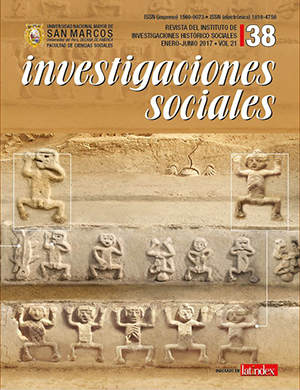The Opposition in Peruvian Political Transition between years 2000 and 2002
DOI:
https://doi.org/10.15381/is.v21i38.14234Keywords:
politics parties, democratic transition, weak democracy, recovery of democracyAbstract
The present research’s topic is how was the political parties’s participation during the end of Fujimorismo. It is specially analyzed partie’s constitution, identifying leaders and their political ideology. Another relevant section of the research is about the relations with their social bases, explaining their weaknesses and strenghts in dealing with this issue. First, parties that emerged after 2000 are characterized by an structure lacking of institucional bases. Their leaders arises from improvisation, as a result of the party system collapse in the eighties. It is also remarked the influence of the Peruvian Army in local politics. In this context, technocracy becomes the most important institucional reference, aside with new political ideologies that compete in the electoral arenaDownloads
Published
Issue
Section
License
Copyright (c) 2018 Gustavo Hermoza Alarcón

This work is licensed under a Creative Commons Attribution-NonCommercial-ShareAlike 4.0 International License.
AUTHORS RETAIN THEIR RIGHTS:
a. Authors retain their trade mark rights and patent, and also on any process or procedure described in the article.
b. Authors retain their right to share, copy, distribute, perform and publicly communicate their article (eg, to place their article in an institutional repository or publish it in a book), with an acknowledgment of its initial publication in Investigaciones Sociales.
c. Authors retain theirs right to make a subsequent publication of their work, to use the article or any part thereof (eg a compilation of his papers, lecture notes, thesis, or a book), always indicating the source of publication (the originator of the work, journal, volume, number and date).






